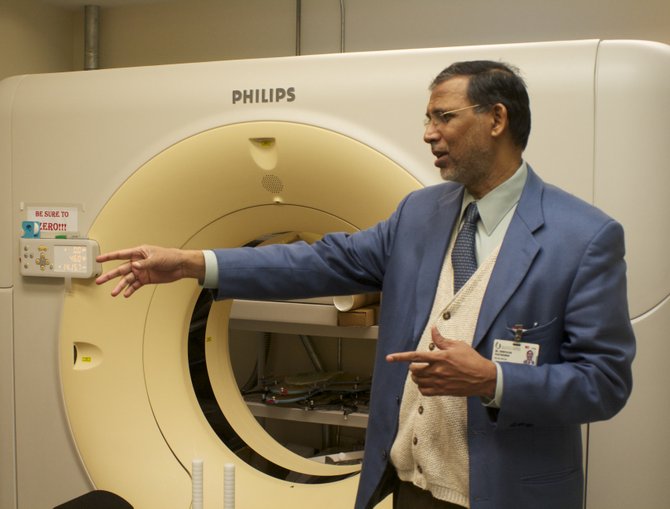Dr. Srinivasan Vijayakumar, deputy director of the UMMC Cancer Institute, believes the university will get National Cancer Institute designation within the next five years. Photo by Jacob Fuller.
Travelers on Lakeland Drive west of Interstate 55 will have to deal with delay-causing construction a little longer.
Crews began paving what will become a new entrance to the University of Mississippi Medical Center earlier this month. UMMC spokesman Jack Mazurak told the Jackson Free Press that the crews will likely complete construction on the entrance road in mid-January.
The state's only medical school began the first step of an ambitious 15-year plan this year when contractors began removing trees and medians on Lakeland Drive to make way for a new entrance to the UMMC campus. Crews also have begun construction of a new heart center near the middle of campus.
Once crews complete the entrance road, the school will begin construction on a new, state-of-the-art School of Medicine. The building will provide instructors and students a place for academic research, learning and study outside the on-campus hospital, something the school doesn't currently have.
After the School of Medicine, the next step in the plan is The Cancer and Biomedical Research Center. Dr. Srinivasan Vijayakumar is the chairman of the university's Department of Radiation Oncology and the deputy director of the school's Cancer Institute. He told the JFP that The Cancer and Biomedical Research Center is one of the keys to UMMC becoming a National Cancer Institute-designated treatment center.
There are 67 NCI-designated centers nationwide. They lead the way in developing new and more effective approaches to prevent, diagnose and treat of cancer. The closest designated centers to Jackson are St. Jude's Children's Research Hospital in Memphis, Tenn., and University of Alabama-Birmingham Comprehensive Cancer Center in Birmingham, Ala.
The need for such a center here is undeniable. While Mississippi ranks 20th in the nation in occurrences of cancer with 477.1 per 100,000 people, it ranks third in cancer deaths with an average of 204.7 deaths per 100,000 for the last five years.
The state's statistics are not an anomaly. Of the top six states in cancer death rates--Kentucky, West Virginia, Mississippi, Louisiana, Tennessee and Arkansas--only Tennessee has a NCI-designated center. The six states with the lowest cancer death rates--Utah, Hawaii, Arizona, Colorado, New Mexico and California--all have NCI-designated centers.
That is largely because those centers have access to federal funding for state-of-the-art equipment and for research into new and more effective treatments.
It takes years to get NCI designation. NCI has requirements the hospitals must reach, both in the research center and the researchers. UMMC's biggest step, Vijayakumar said, is building a new cancer-research center.
The Cancer and Biomedical Research Center, which will be part of a larger research park on the UMMC campus, will be one of the two key elements for NCI designation. Vijayakumar said the school has already begun securing the other key element: researchers.
"We have recruited eight Ph.D. research people who do cancer-related research," Vijayakumar said.
UMMC is the only facility in the state that can do such translational research at this time, which involves turning findings from basic scientific study into practical application in the field of cancer treatment and prevention.
Once UMMC builds and moves into The Cancer and Biomedical Research Center, it will apply for NCI designation, Vijayakumar said.



Comments
Use the comment form below to begin a discussion about this content.